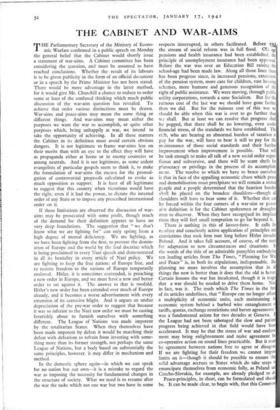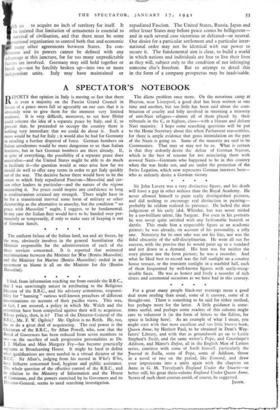THE CABINET AND WAR-AIMS
THE Parliamentary Secretary of the Ministry of Econo- mic Warfare confirmed in a public speech on Monday the general belief that the Cabinet would shortly issue a statement of war-aims. A Cabinet committee has been considering the question, and must be assumed to have reached conclusions. Whether the result of its labours is to be given publicity in the form of an official document or in a speech by the Prime Minister has not been stated. There would be more advantage in the latter method, for it would give Mr. Churchill a chance to reduce to order some at least of the confused thinking which much public discussion of the war-aim question has revealed. To achieve that order various distinctions must be drawn.
War-aims and peace-aims may mean the same thing or different things. And war-aims may mean either the purposes we want the war to accomplish, or quite other purposes which, being unhappily at war, we intend to take the opportunity of achieving. In all these matters the Cabinet in its definition must avoid certain obvious dangers. It is not legitimate to frame war-aims less on their merits than with an eye to the effect they will have as propaganda either at home or in enemy countries or among neutrals. And it is not legitimate, as some ardent evangelists of particular gospels seem to think it, to make the formulation of war-aims the excuse for the promul- gation of controversial proposals calculated to evoke as much opposition as support. It is least of all legitimate to suggest that this country when victorious would have the right, even if it had the power, to dictate the internal order of any State or to impose any prescribed international order on it.
If those limitations are observed the discussion of war- aims may be prosecuted with some profit, though much of the demand for their definition appears to have no very deep foundations. The suggestion that " we don't know what we are fighting for" can only spring from a high degree of mental deficiency. We are fighting, as we have been fighting from the first, to prevent the domin- ation of Europe and the world by the foul doctrine which is being proclaimed in every Nazi speech and demonstrated in all its bestiality in every article of Nazi policy. We are fighting to keep the free nations of Europe free, and to restore freedom to the nations of Europe temporarily enslaved. Hitler, it is sometimes contended, is preaching a new order in Europe, and we must have a new and better order to set against it. The answer to that is twofold. Hitler's new order has been extended over much of Europe already, and it becomes a worse advertisement with every extension of its corrosive blight. And it argues an undue depreciation of the pre-war order to suggest that because it was so inferior to the Nazi new order we must be casting feverishly about to furnish ourselves with something different. The League of 'Nations was made impotent by the totalitarian States. When they themselves have been made impotent by defeat it would be matching their defeat with defeatism to refrain from investing with some- thing more than its former strength, not perhaps the same League of Nations, but a body based on substantially the same principles, however. it may differ in mechanism and method.
In the domestic sphere again—in which we can speak for no nation but our own—it is a mistake to regard the war as imposing the necessity for fundamental changes in the structure of society. What we need is to resume after the war the tasks which not one war but two have in some respects interrupted, in others facilitated. Before 3[4 the stream of social reform was in full flood. Olti age pensions and health insurance had been established, the principle of unemployment insurance had been approved. Before the war was over an Education Bill raising the school-age had been made law. Along all those lines there has been progress since, in increased pensions, extensions of the pension system, more care for children, vast housing schemes, more humane and generous recognition of the right of public assistance. We were moving, through public utility corporations, towards a sane Socialism. But for the ruinous cost of the last war we should have gone farther than we did. But for the ruinous cost of this war we should be able when this war is over to go farther than shall. But at least we can resolve that progress shall be pegged, that there shall be no lowering, even under financial stress, of the standards we have established. The rich, who are bearing an abnormal burden of taxation to pay for the war, will have to bear it still to pay for the maintenance of those social standards and their further improvement when improvement is possible. That will be task enough to make all talk of a new social order super- fluous and subversive, and there will be scant shrift for plutocracy or privilege in the process of its accomplish. ment. The resolve to which we have to brace ourselves is that in face of the appalling economic chaos which peace and demobilisation must precipitate we will remain a united people and a people determined that the heaviest burden shall be placed on the broadest shoulders—though all :Moulders will have to bear some of it. Whether that can be forced within the four corners of a war-aim or peace- aim definition is for the Cabinet spokesmen or draughts men to discover. When they have recognised its implica• tions they will feel small temptation to go far beyond it.
There is nothing in this of laissez-faire. It calls for resolute and ceaselessly active application of principles and convictions that took firm root long before Hitler invaded Poland. And it takes full account, of course, of the need for adaptation to new circumstances and situations. In the words of the title of an admirable pamphlet embodying ten leading articles from The Times, "Planning for War and Peace " is, in both its stipulations, indispensable. But planning no more involves the assumption that in all things the new is better than it does that the old is better. Certain lessons the war has inculcated, though it is tragi that a war should be needed to drive them home. Nor in fact, was it. The truth which The Times in the fir of its articles underlines, that " Europe can no longer affor a multiplicity of economic units, each maintaining i economic system behind a barbed wire entanglement tariffs, quotas, exchange restrictions and barter agreements' was a fundamental axiom for two decades at Geneva.
the League had not been sabotaged the slow and pati progress being achieved in that field would have been accelerated. It may be that the stress of war and enslave ment may bring enlightenment and make agreement fa co-operative action on sound lines practicable. But it m be agreement between nations free to agree or disagree If we are fighting for their freedom we cannot impost limits on it—though it should be possible to ensure th solid advantage accrues to States which do take -steps tt emancipate themselves from economic folly, as Poland an Czecho-Slovakia, for example, are already pledged to d Peace-principles, in short, can be formulated and sbo be. It can be made clear, to begin with, that this Commo Ith set . to acquire no inch of territory for itself. It be insisted that limitation of armaments is essential to survival of civilisation, and that there must be some rnational organisation to control both that and economic many other agreements between States. Its con- 'tution and its powers cannot be defined with any advantage at this juncture, for far too many unpredictable factors are involved. Germany may still hold together or break up—not be forcibly broken up—into two or more independent units. Italy may have maintained or repudiated Fascism. The United States, Russia, Japan and other lesser States may before peace comes be belligerent— and in each several case victorious or defeated—or neutral. Our desire for a particular settlement and a particular inter- national order may not be identical with our power to secure it. The fundamental aim is clear, to build a world in which nations and individuals are free to live their lives as they will, subject only to the condition of not infringing someone else's freedom. But to attempt to detail this in the form of a company prospectus may be inadvisable.































 Previous page
Previous page